Michael Tucker at Lessons From The Screenplay has just released another brilliant video essay, this time discussing when a Character’s mask slips, they take a leap of faith and they embrace what they really need to do in order to become their best self.
Jamie Foxx’s character in Michael Mann’s 2004 film Collateral goes on this kind of journey, brought out of his shell by force thanks to the film’s antagonist, played by Tom Cruise.
No matter what structure you choose to follow when crafting your script, at some point there will be a moment after your setup and before your conclusion when something has to change. Tucker’s video essay provides a great example of a film that does this well:
]]>Faith, Belief, and Religion
Taking a respite from the usual format for Types Tuesday, as I found this brilliant video essay and just had to share it.
Faith and Belief are unique to every person, whether they are religious, spiritual, agnostic or atheist. It is a universal struggle, whoever you are, and it is something so nuanced that it can make for excellent drama, and create rich, empathetic conflicts for your Characters. It makes for such interesting and engaging stories.
Video Essay
I’ll discuss this in a little more detail on Thursday, but for now, I hope this video essay, by 21st Century Cinephile on Youtube, gives you something to think about:
]]>This week we’re taking a breather from Writing Exercises. Instead, I wanted to share a really interesting video essay. As you know, I believe genre is meaningless, Heretic that I am, but Patrick H Willems has created a great video essay praising those filmmakers who started out making horror films with an absurd comedic edge to them, and crafted some of the most interesting blockbusters in recent years. Not necessarily full of screenwriting advice, but it’s a good reminder of how important it is that you remember what kind of tone and atmosphere you are aiming to evoke to those reading your screenplay:
]]>This year’s frontrunner for Best Picture at the Oscars, The Shape of Water, is released in UK cinemas today. Though I’m yet to see it, I’ve heard nothing but good things about this unconventional love story, directed by Guillermo Del Toro.
Del Toro is well known for his love of movie monsters, and since his films feature so many fantastical creatures, he always does his best to make sure they evoke sympathy. His Monsters are often more human than the other characters in his films. It’s a trick he learned from classics like King Kong and Frankenstein. In yet another excellent video essay from Patrick H Willems, whose work we’ve shared here before, this underappreciated form of characterization is covered in more detail:
Even if your “monster” is more like the Xenomorph from the Alien movies, and less of a sympathy-evoking character like the Fishman in The Shape of Water, it’s important to treat your otherworldly antagonist with the same amount of respect you’d give a human antagonist.
If you’re on Pinterest, why not follow my Pinterest board full of useful writing advice? It will be updated weekly, so you can keep track if you ever need an excellent video essay or some relevant advice about problems you are facing. You can always drop me a line at [email protected] with the subject “Ask Laurie” and I will do my best to answer it. I might even include it in an upcoming edition of Writing Advice Wednesday!
]]>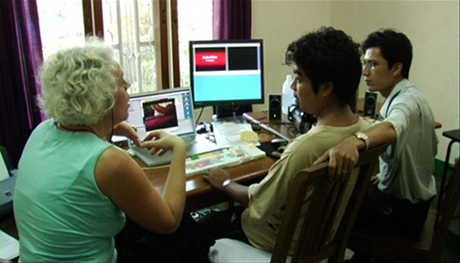 You may think, as a writer or just someone who enjoys watching Documentaries on TV and at the Cinema, that because they are non-fiction that no effort is required to create characters. This couldn’t be further from the truth – Documentaries don’t work, even though there is automatically a story to be told unless the Director and Editor can craft compelling characters out of the story presented to them, and the footage they shoot.
You may think, as a writer or just someone who enjoys watching Documentaries on TV and at the Cinema, that because they are non-fiction that no effort is required to create characters. This couldn’t be further from the truth – Documentaries don’t work, even though there is automatically a story to be told unless the Director and Editor can craft compelling characters out of the story presented to them, and the footage they shoot.
How to find the Character
Once a Documentary has finished shooting, there are hours and hours of footage to go through. This is where the character is created, as opposed to on a page before the cameras even start rolling. There is an element of creating the character during filming when a director decides what angles to shoot their subject at, or when to film them during their day-to-day activities or in an interview. But it all comes down to the edit suite.
The key is to pick the moments in the life and clips that reinforce what you think is most true about the character; you have to decide what the essence of the subject is and find the moments that will strengthen that and don’t confuse things. Real lives are messy and inconsistent, but they can’t afford to be shown in the same way in a Documentary, or you immediately betray your character, and your audience will remain unengaged.
Tying Character to Subject matter
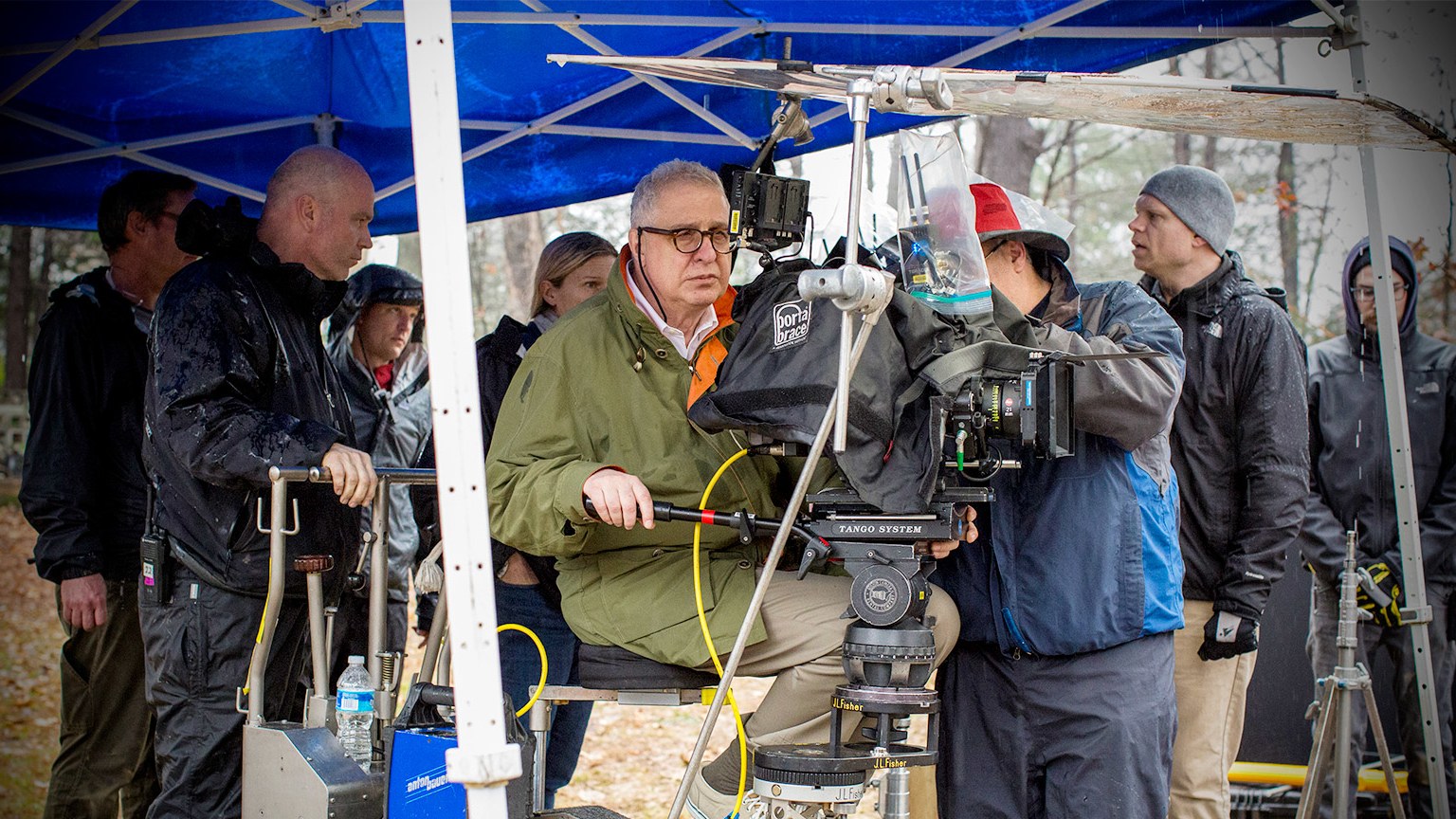 Just because you edit the footage of your real-life subject doesn’t mean they can’t be surprising or complicated, but you want their presentation onscreen to be consistent, in the same way that a screenplay needs to be structured. If they are not “written” in the edit, you are just presenting improvisation, which very few filmmakers can pull off effectively.
Just because you edit the footage of your real-life subject doesn’t mean they can’t be surprising or complicated, but you want their presentation onscreen to be consistent, in the same way that a screenplay needs to be structured. If they are not “written” in the edit, you are just presenting improvisation, which very few filmmakers can pull off effectively.
Make sure the actions and dialog of the characters you include in the documentary relate directly to the theme or subject of your documentary. What we see of your character should demonstrate the worldview that they have. When your selected footage shows the audience how your character sees the world, then you’ve got a character as good as any that you could create yourself.
If your documentary is trying to make a point, you need to ensure your subjects either make that point for you, or at least are edited to reinforce your point- for example, if there is some injustice your documentary is trying to combat, make sure we see the effect the injustice has on your characters. If you’re trying to tell a story about one particular figure, make sure you present to the audience exactly why this figure is interesting enough to dedicate an entire documentary to. No matter how good your documentary, it will be nowhere near as good if you don’t tie your subject directly to the subject matter.
Examples
Here are a few great examples of Documentaries that craft characters effectively. I’ll try not to go into too much detail, so I don’t spoil them for you! All are well worth watching as exercises in how to craft characters in non-fiction stories.
The Imposter
 The Imposter works so brilliantly because its central subject, Frédéric Bourdin- a great example of a Power of Ambition figure, incidentally- is so unreliable yet persuasive. Your opinion of him continually switches as the story unfolds. This is down to a central creative choice, explained in more detail by Tony Zhou’s video essay below, of having Frédéric address the camera directly. No other subject in the film is interviewed in this way.
The Imposter works so brilliantly because its central subject, Frédéric Bourdin- a great example of a Power of Ambition figure, incidentally- is so unreliable yet persuasive. Your opinion of him continually switches as the story unfolds. This is down to a central creative choice, explained in more detail by Tony Zhou’s video essay below, of having Frédéric address the camera directly. No other subject in the film is interviewed in this way.
The documentary is all about questioning what is real or not, and the documentary is shaped around Frédéric’s testimony. Every second he is on screen, it feels like his performing. We never see him act naturally, as though he is a flawed individual. He is shown to be always putting on a front, and the mystery of what is behind that is what grips the audience throughout.
Tickled
 New Zealand documentary Tickled explores the unbelievable story of a dark conspiracy behind competitive tickling videos. To say any more would be to ruin the whole film. But the key figure behind it all, who is hardly seen, has a presence felt throughout the film.
New Zealand documentary Tickled explores the unbelievable story of a dark conspiracy behind competitive tickling videos. To say any more would be to ruin the whole film. But the key figure behind it all, who is hardly seen, has a presence felt throughout the film.
Every single figure in the documentary, apart from director and presenter David Farrier, is only shown in relation to the central figure at the top of the conspiracy. Not only does it make their eventual appearance all the more impactful, but effectively demonstrates the reach that they have, and the lives that have been ruined by interacting with them- very much a Power of Will character.
By the end of the documentary, the only character we are genuinely interested in is the person behind the tickling conspiracy that spans decades and continents. This was a deliberate creative decision because they are by far the most engaging subject in the documentary. Nobody else is defined outside of their relation to the mysterious central subject, so all our attention is kept on that central subject.
Catfish
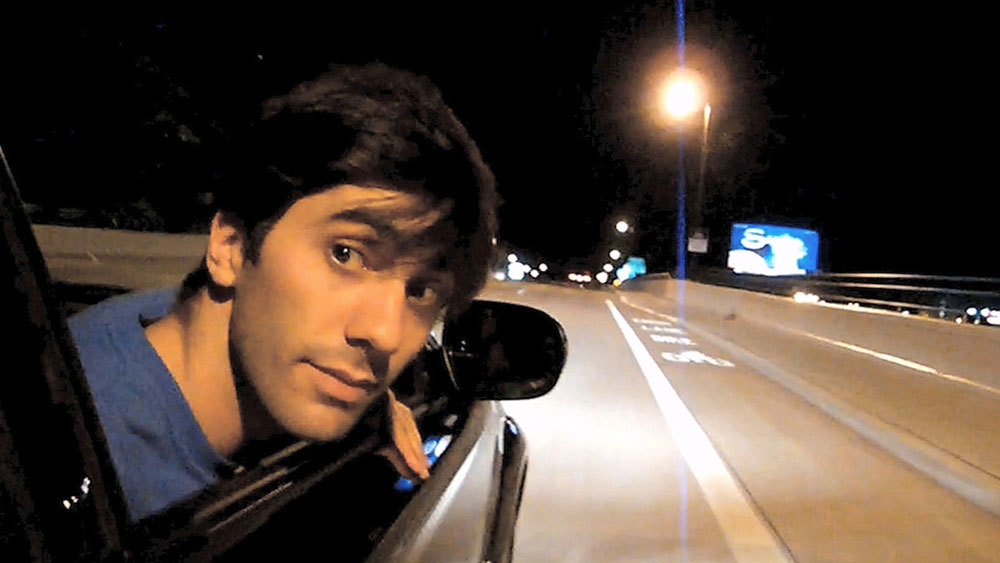 To say much more than Catfish is a Power of Love story would be to give the whole thing away. But the theme of the documentary is that of combating loneliness. Despite the initial appearance of being a mystery, at its core Catfish is a love story. Director and subject Nev Schulman has an online relationship with a girl calling herself Megan, but all is not as it appears. Nev and Megan’s actions throughout the film- as their relationship is the central focus of the film- are driven by a need to be loved.
To say much more than Catfish is a Power of Love story would be to give the whole thing away. But the theme of the documentary is that of combating loneliness. Despite the initial appearance of being a mystery, at its core Catfish is a love story. Director and subject Nev Schulman has an online relationship with a girl calling herself Megan, but all is not as it appears. Nev and Megan’s actions throughout the film- as their relationship is the central focus of the film- are driven by a need to be loved.
Megan is mainly offscreen as Nev takes the viewer on a journey, so we begin by experiencing his lust, curiosity, disappointment, and excitement (not necessarily in that order) and finish by learning about Megan’s needs and wants. The documentary only shows us Nev in relation to what he wants and needs from Megan, so all we are focused on is who he is as Megan’s lover, not as a three-dimensional person.
Both subjects are trying to find love and to be loved by another, and the documentary is successful at showing those desires by focusing exclusively on the lengths both characters go to be with one another.
Tickling Giants
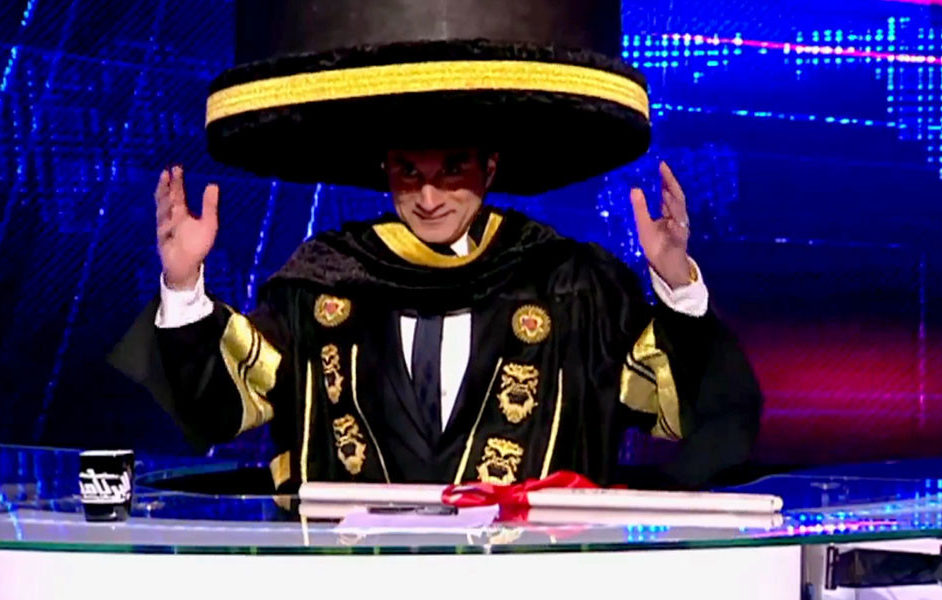 Bassem Youssef, the Egyptian equivalent of fellow Power of Truth figure Jon Stewart, is the subject of this documentary. Youssef creates a satire show that lampoons Egyptian politicians, and the film tracks the show’s rise, fall and Bassem’s exile from the country that fell in love with his desire to call out injustice and incompetence.
Bassem Youssef, the Egyptian equivalent of fellow Power of Truth figure Jon Stewart, is the subject of this documentary. Youssef creates a satire show that lampoons Egyptian politicians, and the film tracks the show’s rise, fall and Bassem’s exile from the country that fell in love with his desire to call out injustice and incompetence.
Youssef is shown to be reckless in pursuit of satire, standing up to his country’s leaders no matter the cost to those he loves. Even when he is with his parents, wife, children, and friends, anything he says or does is concerning his show. He cares for his staff, who also feature, but all of them are presented in the same way as Bassem – calling out those in power for what they do to the people of Egypt.
By focusing on Bassem’s show, as opposed to just Bassem, Tickling Giants successfully shows the viewer what satire means to the subjects of the documentary, and what it stands for in a country like Egypt. The show that the subjects have created is bigger than any single one of them, which is a point Bassem constantly raises both through his narration and to everyone he interacts with in the film.
Exit Through The Gift Shop
 This documentary smartly diverts attention from its director- the artist Banksy, who chooses to remain anonymous- by distracting the viewer with another artist called Mister Brainwash. Mister Brainwash completely misses the point of Banksy’s art when he tries to imitate him, which is where the humour of the film comes from.
This documentary smartly diverts attention from its director- the artist Banksy, who chooses to remain anonymous- by distracting the viewer with another artist called Mister Brainwash. Mister Brainwash completely misses the point of Banksy’s art when he tries to imitate him, which is where the humour of the film comes from.
Mister Brainwash is such a larger-than-life, Power of Excitement character that the viewer forgets that the documentary is meant to be about Banksy- a shrewd move by a man who wants to be left alone so people will just focus on his art and not the artist behind them.
Exit Through The Gift Shop is ultimately about whether there is any point to art, and whether something with no thought behind it can be called art. Mister Brainwash hilariously proves Banksy’s thesis right. By focusing entirely on a subject who distracts from the intended subject of the documentary, the viewer becomes more interested in the themes of the film and less on the figure who is directing.
Banksy is the documentary’s starting point, but he wisely takes control of the film’s narrative, so Mister Brainwash becomes our guide to the stupidity behind much of modern art. He is a character who is all style and no substance, so it is left to the viewer to decide whether he can be called an artist in the same way as Banksy is perceived to be an artist. This documentary is the ultimate act of self-deprecation.
Call Me Lucky
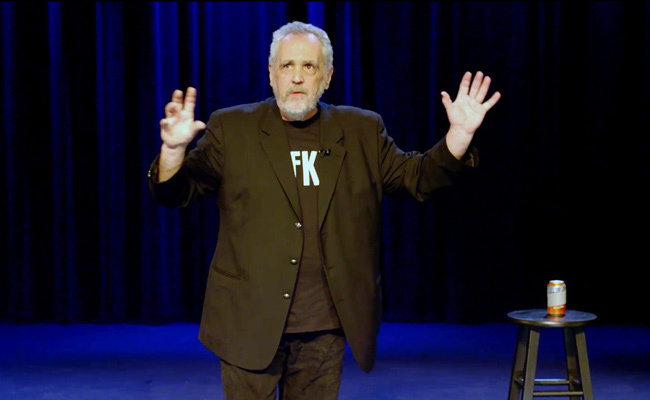 Call Me Lucky only works because of the journey that its subject, Barry Crimmins, goes through. If it had focused exclusively on Barry’s life as a stand-up comedian, it just wouldn’t work that well. Barry rages against the system, but it is what happens to him after he leaves the world of comedy behind that reinforces his viewpoint.
Call Me Lucky only works because of the journey that its subject, Barry Crimmins, goes through. If it had focused exclusively on Barry’s life as a stand-up comedian, it just wouldn’t work that well. Barry rages against the system, but it is what happens to him after he leaves the world of comedy behind that reinforces his viewpoint.
He is portrayed as a survivor and a victim, and this is the motivation that drives his moral crusade and successful activism (as to what he is crusading against, you’ll have to watch the documentary to find out- no spoilers here!)
Barry Crimmins is a Power of Conscience character, who operates by his own rules. This leads him to self-destructive behaviour early on, but once he finds a purpose to direct his unique moral code and brand of justice towards, he begins to heal as a person. The film always shows Barry in relation to his activism- whether being interviewed, portrayed in archive footage or talked about by other people, he only has justice on his mind. This documentary is about justice, and has a thoroughly likeable central subject to keep the audience engaged with the justice that needs to prevail.
Video Essay
This excellent video essay describes why The Imposter is so effective in its crafting of a character. Fair warning, it spoils the entire film, so go and watch it first!
]]>
It’s exercises like the one below that form part of my One Hour Screenwriter course, which will help you write an entire feature film script in 22 weeks. You can purchase it at the shop here. You can also read testimonies here that show my methods have worked for a variety of writers.
This week, it’s time to take a long, hard look at yourself…
Learn to Write What You Can Write
There isn’t a writer anywhere in the world that hasn’t felt overwhelmed, paralyzed, stymied or stuck. This feeling is a natural part of the writing process. It is a signal to stop and let the creative unconscious do its work.
It’s like trying to forcefully recall the name of a song on the tip of your tongue. The harder you try to think of the name the further it recedes from your grasp. The same is true with writing.
Does that mean you should stop writing and wait for inspiration to strike? No! It means you should prime the pump to get the creative juices flowing. How do you do that?
Write what you can write. Don’t worry about what you can’t write. Do a writing exercise or start with yourself.
For example: Answer the following questions in as much detail as possible:
1) Aside from writing well, what is the one thing you would like to do before you die?
2) What is your favorite thing about the physical space in which you live? Why?
3) Aside from your writing tools, house or car, what is the one physical inanimate object you couldn’t live without? Why?
4) Aside from writing, what is the one subject you are most opinionated about or the most passionate about? Why?
5) What’s the best decision you ever made? Why?
6) If you unexpectedly won $500, what would you do with the money?
7) What’s the best thing you ever got as a present? Why?
8) What is your ideal vacation or holiday trip? Why?
9) What’s the worst thing you’ve ever done to someone?
10) If you came back to life in a different career or profession, what would it be? Why?
11) What makes you feel in touch with your higher self? What makes you feel inspired or transcendent or moved in a profound way?
12) What is your lucky charm or talisman? Or has some object or item followed you around from place to place? It might be something silly you just like to have around? What is it?
Do you see any interesting patterns or recurring themes in your answers? What do your answers say about you? What themes, issues or words keep coming up? List these patterns and themes in your answers.
Now, answer the 12 questions for your main character.
Do you see patterns or themes you can explore?
What would drive your character crazy?
What would push your character outside his or her comfort zone?
What would make your character angry, upset or anxious?
What could you take away that would make your character miserable?
What would devastate or destroy your character?
What would make your character panic or lose control?
How many story events about those themes, patterns or situations can you create?
Add and embellish your notes. And keep writing!
Video Essay of the Week
I’m a huge fan of the most recent Planet of the Apes movies, and the second part of the trilogy, in particular, demonstrates the importance of perspective and thinking about the perspective of characters:
Let me know what you think of this week’s writing exercise by emailing me at [email protected]. I’d love to hear from you as we go forward with more of these writing exercises. We’ll be back in the New Year with more writing exercises. Time to enjoy the holidays!
Until next time, remember- all you need to do is Get Started and Keep Going! But perhaps take Christmas off- you’ve earned it.
– Laurie
]]>I hope you’ve been enjoying Writing Advice Wednesday for the last few months, but I’m trying something different for the rest of the year’s posts. As well as a relevant video essay I’ve found, I’ll be giving you writing exercises to jump-start your new script or novel. It’s exercises like this that form part of my One Hour Screenwriter course, which will help you write an entire feature film script in 22 weeks. You can purchase it at the shop here. You can also read testimonies here that show how this process has worked for a variety of writers.
This week, it’s time to feel…
Writing with Empathy and Emotion
This is a two-minute exercise that might change the way you think about film.
Sit back and remember the first time you walked out of a movie thrilled, stunned or amazed by the power of what you just saw.
What was the name of the film that produced that first profound effect for you? Write down the name of the film.
Now write a brief description of the most memorable scene in that film. By this I mean a scene in which something happens to someone.
What physically was happening in the scene you remember so vividly?
Was the scene you described a scene in which the character is incredibly vulnerable? Is it a crossing a border scene or a scene about entering a new world? Is it a release scene after an intense scene where something terrible or unsettling happens to the character?
What we remember most clearly is pain and vulnerability.
Creating vulnerability is the most powerful tool you have to bond your audience firmly to your character. Moments of character vulnerability (physical, emotional or spiritual vulnerability) are what make a film truly memorable.
This is something that you know already intuitively. It is an important trigger in all the films that you love best. You may not be consciously aware of it. But it is right there in plain sight and your own experience proves it.
Think of any truly memorable scene in a favorite movie and some kind of character vulnerability will be central to the moment.
Remember a time when you felt really vulnerable, alone, rejected, humiliated, unloved, or misunderstood. Remember the exact words or actions that made you feel that way. Quickly write the circumstances as you remember them.
Remember a time when you felt physically at risk, afraid, or in danger. It doesn’t matter if the danger was real or not. What’s important is that you feared for your safety.
Remember the exact circumstances that frightened you. Quickly write scenario as you remember it.
Remember a time when you were on the threshold of something brand new. Quickly write how you felt leaving your old life, old friends, old job or old circumstances behind.
Explore what it was like to face the complete unknown and dive into an uncharted or untested set of circumstances or a new situation.
How did it feel to cross the “border” into a new life or embark on a new journey? Was it sad or thrilling?
Loss always makes us vulnerable and something isn’t thrilling unless there is a little bit of danger attached. Danger always makes us vulnerable.
Remember a time when someone you loved or trusted betrayed you. It can be a small personal betrayal or a larger more public betrayal.
Remember the details of what that betrayal was and how it was revealed to you.
Remember how it made you feel. Quickly write about the situation as you remember it.
Now write the answers to the above questions for your character.
Write a list of possible events that could make your character feel really vulnerable, alone, rejected, humiliated or unloved.
List the specific actions or circumstances that would make your character feel that way.
List the kinds of things someone could say or do to evoke those feelings in your character in the present.
Write a list of situations in which you character would feel physically at risk, afraid or in danger.
What physical circumstances are most likely to make your character feel panic or terror?
What situations does your character find most physically challenging or frightening?
What new threshold does your character cross? How is that a fearful, sad or dangerous prospect for him or her?
Write a list of possible situations in which your character might feel betrayed, be set up for a fall, or played for a fool.
List the most hurtful possible things that could happen to your character in the story.
Video Essay of the Week
Lessons From The Screenplay gives us two very different examples of detectives pushed to their limits, and how they handle being faced with incredible adversity:
Let me know what you think of this week’s writing exercise by emailing me at [email protected]. I’d love to hear from you as we go forward with more of these writing exercises. Next week, it’s time to make it all about you…
Until then, remember- all you need to do is Get Started and Keep Going!
– Laurie
It’s exercises like the one below that form part of my One Hour Screenwriter course, which will help you write an entire feature film script in 22 weeks. You can purchase it at the shop here. You can also read testimonies here that show my methods have worked for a variety of different writers.
This week, it’s time to let it all out…
Writing what is said and what is revealed
Write a dialogue between two people in a grocery store. They only have enough money to buy one small container of ice cream. They will have to share the treat.
Quickly write their argument, debate or negotiation with each other over which flavor to purchase. But allow the characters to talk only about the ice cream choice. Let everything else lie just below the surface of the conversation.
What flavor is each person’s favorite? What can you tell us about their philosophy of life as they debate the relative merits of their personal choices?
 What does their preferred ice cream flavor say about what they value or enjoy in life? Make each person passionate about his or her personal favorite.
What does their preferred ice cream flavor say about what they value or enjoy in life? Make each person passionate about his or her personal favorite.
How does one person try to persuade the other? What tactics and strategies are used? How does the other person respond? How is each choice defended or promoted?
How is the flavor finally selected? What does their argument say about their relationship and relative status or power? Are they equals? Are they partners in crime? Are they in love? Are they friends? Are they competitors? Are they afraid of each other?
How can we intuit information about their relationship in their manner of debating and selecting the ice cream choice?
What flavor is finally purchased? How was it selected? Who won the battle? What was the final deciding factor? Why?
What are the consequences? How does this choice affect their relationship? How can we figure this out by how they respond to each other in the final purchase process and aftermath?
Arguments about seemingly mundane or insignificant things are a good way to show who a character is underneath his or her façade.
A personal and very specific argument about ice cream or whose turn it is to walk the dog can reveal volumes about who someone is, what they value and what kind of relationship they have with someone else.
Use this technique to show us what is under the surface of your character.
Describe a scenario in which your character argues with someone about an insignificant matter that reveals larger issues and looming power conflicts below the surface.
Video Essay of the Week
This week’s writing exercise is all about the control of information, as is Alex Garland’s sci-fi masterpiece Ex Machina. Lessons From The Screenplay tells us more:
Let me know what you think of this week’s writing exercise by emailing me at [email protected]. I’d love to hear from you as we go forward with more of these writing exercises. Next week, it’s time to think about other people and not just yourself…
Until then, remember- all you need to do is Get Started and Keep Going!
– Laurie
I hope you’ve been enjoying Writing Advice Wednesday for the last few months, It’s exercises like this that form part of my One Hour Screenwriter course, which will help you write an entire feature film script in 22 weeks. You can purchase it at the shop here. You can also read testimonies here that show my methods have worked for a variety of writers.
This week, it’s time to really let loose…
Describe what makes you explode
Write about something that makes you furious. It can be a work situation, a political issue, a personal dispute with someone, an aggravating annoyance of modern life, an unreasonable demand made upon you, an infuriating relationship or anything else that raises your blood pressure and makes you want to scream!
Take seven minutes and describe as completely as you can the source of your ire and outrage.
Is your anger generated by a specific person? What does he or she look like? What exactly does the person say or do to drive you mad? Describe the physical circumstances of the dispute or bad blood between you. Be as specific as you can.
Is your anger generated by an issue, situation, or annoyance of modern life? What is it about those circumstances that is so
unfair, unreasonable, outrageous or personally offensive?
How does your anger about this make you feel? Does some kind of fear trigger your anger? Be as florid and passionate as you can.
Now take seven minutes to argue and rage from the opposite point of view. Put yourself in the other person’s shoes or on the other side of the issue.
Describe yourself or the situation from the opposing perspective. Be as detailed and cutting as you can.
Make just as strong a case why you are totally wrong, misguided, insensitive or uncomprehending of their position or situation.
Discuss in detail why you are deluded, naïve, selfish, stubborn, shallow or ungrateful. Be as passionate and as convincing as you can.
Great writers argue just as ardently for their villains as they do for their heroes. Even though the villain may be wrong, destructive or deluded, he or she must have a strong personal rationale for all actions and choices.
Explore what fear might be driving the antagonist’s behavior or position. Be zealous on his or her behalf. Suspend your judgment and personal opinion and really try to see the world from your antagonist’s point of view.
Write down all the reasons why your antagonist believes he or she is justified in taking action against your character.
Outline in as much detail as possible your antagonist’s rationale. Describe why your antagonist truly believes he or she is right.
Video Essay of the Week
Speaking of antagonists, Lessons from the Screenplay reminds us of one of the best examples in recent memory:
Let me know what you think of this week’s writing exercise by emailing me at [email protected]. I’d love to hear from you as we go forward with more of these writing exercises. Next week, you’ll find out just how much a simple conversation can reveal…
Until then, remember- all you need to do is Get Started and Keep Going!
– Laurie
I hope you’ve been enjoying Writing Advice Wednesday for the last few months, but I’m trying something different for the rest of the year’s posts. As well as a relevant video essay I’ve found, I’ll be giving you writing exercises to perform, if you’re keen to either get some practice, or need some motivations to start a new script or novel. It’s exercises like this that form part of my One Hour Screenwriter course, which will help you write an entire feature film script in 22 weeks. You can purchase it at the shop here. You can also read testimonies here that show my methods have worked for plenty of other people.
This week, your rubbish. That’s right, yours!
Describe what your trash says about you
 Objects can define people. What people buy, what they own, what they use, what they keep and what they throw away can tell a very interesting and illuminating story.
Objects can define people. What people buy, what they own, what they use, what they keep and what they throw away can tell a very interesting and illuminating story.
Take a look into your own trash can (not your wastebasket, the big barrel you haul out to the street). Or, if you live in an apartment building, the bags you dump down the garbage chute.
Mentally examine the items in your personal garbage. Pretend you are an archeologist or an anthropologist.
What does this garbage reveal about your lifestyle, ethnicity, gender or marital status? What clues about your love life are in the trash?
What does the trash say about your income level?
How could the garbage be a clue to how much money you spend?
What does the trash say about the composition of your household? What kinds of personal and family clues are in the garbage barrel?
What kinds of food items are in the barrel or trash bags? Are there the leavings of home-cooked meals, convenience foods or take- away containers? Are there any junk foods, fast food or snack items? What kinds?
What was wasted? What was used up except for a few crumbs or dribbles? What does the garbage say about your culinary skills?
What does it reveal about your time pressures or stress levels?
What kinds of papers or packaging materials are in the trash? What does the garbage say about your purchasing habits? How “green” are you?
If someone rooted around would they find personal correspondence in the trash? What about bills? Could someone tell if you are in debt by looking at the trash? How?
What does trash say about your health? Drinking habits? Personal hygiene? Vanity? Pets? Children? Secrecy or security precautions?
Could someone tell if you are male or female by looking at your garbage? How? What would tip them off?
Now write about what’s in your character’s garbage? What would your character’s discarded items tells us? Answer all the above questions for your character? How do trash items define your character?
Discuss your character’s household and personal habits based solely on the items found in the garbage. Be specific.
Can you write a comic scenario involving your character’s garbage? Can you write a sad or serious scenario?
Can your write a scenario where your character has a profound realization, makes an important discovery or has a personal epiphany by looking at or emptying the trash?
Video Essay of the Week
You’d be surprised how much an exercise like this will reveal- Film & Stuff’s excellent essay on a scene from The Incredibles backs up what I’m talking about:
Let me know what you think of this week’s writing exercise by emailing me at [email protected]. I’d love to hear from you as we go forward with more of these writing exercises. Next week, you’ll be provoked…
Until then, remember- all you need to do is Get Started and Keep Going!
– Laurie